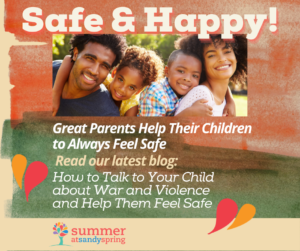Calming Your Kids in Times of Crisis:
How to Talk to Your Child about War and Violence,
and Help Them Feel Safe
 Like you, we have been thoughtfully watching and paying attention to the devastation and violence occurring as war has broken out in Eastern Europe. However young or old your child may be, it is likely that they are hearing about it, too. They may have uncomfortable questions or may just be flummoxed by what’s going on, and as a parent, it’s your job to guide them through it.
Like you, we have been thoughtfully watching and paying attention to the devastation and violence occurring as war has broken out in Eastern Europe. However young or old your child may be, it is likely that they are hearing about it, too. They may have uncomfortable questions or may just be flummoxed by what’s going on, and as a parent, it’s your job to guide them through it.
This is easier said than done; most of us are struggling to find the words to explain it to ourselves. How do you talk to your child about violence and war? How do you help them feel safe? We’re going to walk you through some strategies for your child to address these difficult topics.
For All Ages:
First, and most importantly, reassure your child that they are safe, that you are safe, and that others in their lives are safe (if applicable).
Second, let your children know you’re always available to talk. One conversation is likely not enough to encompass the confusion around what is going on, and they will hear rumors at school, from friends, and snippets from the news. Make sure you’re around to clarify so things stay digestible and in proportion.
Third, keep an eye on your child’s emotional state. Depending on age, maturity, and preference, many children will not express their concerns verbally. Keep an eye out for traumatic reactions like regressive behaviors (bedwetting, for example), but also for simple cues like changes in behavior, appetite, and how they’re sleeping.
Fourth, limit your child’s exposure to TV or the news. Even a channel you may view as “safe” may have breaking news alerts that could alarm your child. Play it safe by monitoring what channels they’re on and the timing they’re viewing these channels so they can avoid being scared.
Below are tips for developmentally appropriate language usage and format to use with your children to explain the current crisis:
Early Elementary:
- Keep information brief and simple.
- Balance providing information with providing reassurances. An example would be “Yes, there are schools that are being targeted in Ukraine. However, your school here is safe, and you will be safe at school when you go tomorrow.”
- Give tangible safety tasks for anxious children, like checking the doors at night. Note: Do not continue if this causes an increase in obsessive concern or checking.
- Recount the positives at the end of the day.
Upper Elementary/Early Middle:
- Reassurances may need to be more complex. You may need to provide concrete examples of what is being done to keep them safe.
- Separate reality from fantasy. At this age, imaginations can go wild on “what if’s” and “what else could happen.” Make sure you manage these expectations, especially as talk on the news is usually catastrophic and that might be what your child is hearing.
- Maintain routine. Even older children benefit from a routine to keep them calm and establish normalcy in a time of crisis.
Upper Middle/High School:
- This is the stage where your child will have strong opinions and complex questions about what is going on. Be prepared for questions about context (“How did this start?”) and ramifications (“Where is it going? Who else could be harmed?”).
- Engage them in dialogue about solutions. Granted, we may not have any, but a discourse into what could go right does wonders for calming anxiety and feeling productive in a time of helplessness.
- Be prepared to discuss tragedy and war in society. You may be asked to dive into philosophical arguments and you may be surprised by your teen’s thought processes. Accept these with an open mind and keep calm as you engage them in conversation.
In times like these, it’s also important to remember the positives. Remind your children that they are blessed to be safe and that they are loved. You can even remind them that fun is coming (hey, summer camp isn’t that far away!). We aren’t above using distraction!
With these tips for communication and comfort, your child should be on the mend from dealing with this crisis and able to focus on what matters: being a kid, and at S@SS, that’s what we’re all about.

Gina Christiano
M.A., Educational Psychology, specialization in School Psychology





